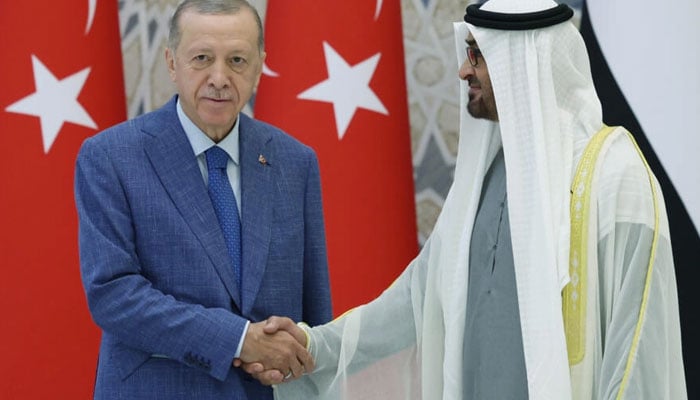Turkey's Erdogan wraps up successful Gulf tour with $50bn deals in UAE
As agreements start taking effect, Turkey's economy will receive a much-needed boost, fostering stability and progress in region
Turkish President Recep Tayyip Erdogan recently completed a successful tour of Gulf countries, focusing on securing investments to revitalise Turkey's struggling economy.
The United Arab Emirates (UAE) became the final destination of his tour, where he signed agreements worth more than $50 billion, according to Emirati state media.
During his visit, Erdogan met with UAE President Sheikh Mohamed bin Zayed Al Nahyan, emphasising the importance of strategic partnership and reinforcing their commitment to stability, economic growth, and progress in the region. The leaders acknowledged the significance of dialogue and diplomacy in resolving disputes and avoiding conflicts.
In addition to the UAE, Erdogan's tour also included stops in Qatar and Saudi Arabia. In Saudi Arabia, a major drone procurement contract with a Turkish defense firm was signed, although the exact amount was not disclosed.
The agreements between Turkey and the UAE covered various sectors, including extradition, energy and natural resources development, space and defense cooperation, investment promotion, security, renewable energy, and transportation.
One noteworthy aspect of the deal involved the Abu Dhabi sovereign wealth fund ADQ, which signed a memorandum of understanding (MoU) to provide up to $8.5 billion in financing for Turkey earthquake relief bonds. ADQ also agreed to finance up to $3 billion in credit facilities to support Turkish exports through an MoU with the Export Credit Bank of Turkiye.
In recent years, Turkey has faced significant economic challenges, including a currency collapse and soaring inflation. Repairing relations with Gulf states was crucial for the country, as ties had been strained following the 2011 Arab Spring uprisings and Turkey's support for organisations linked to the Muslim Brotherhood.
The Gulf tour's success reflects the efforts made to mend relations and attract investments from Gulf countries. The signed agreements and memorandums of understanding are expected to play a vital role in bolstering Turkey's economy and easing the impact of its weakened lira, heavy deficits, and chronic inflation.
President Erdogan expressed his optimism about the tour's outcomes and the strengthened bilateral ties, saying, "With the joint agreement we will sign, we will elevate our relations to the level of strategic partnership. We want to strengthen the legal infrastructure in areas such as investment promotion, security, renewable energy, and transportation."
The diplomatic thaw with the UAE and other Gulf nations has already resulted in increased investment in Turkey, with the potential for even further growth in the future. As the agreements start taking effect, Turkey's economy could receive a much-needed boost, fostering stability and progress within the region and beyond.
-
Murder suspect kills himself after woman found dead in Missouri
-
Poll reveals majority of Americans' views on Bad Bunny
-
Man convicted after DNA links him to 20-year-old rape case
-
California cop accused of using bogus 911 calls to reach ex-partner
-
'Elderly' nanny arrested by ICE outside employer's home, freed after judge's order
-
key details from Germany's multimillion-euro heist revealed
-
Search for Savannah Guthrie’s abducted mom enters unthinkable phase
-
Barack Obama addresses UFO mystery: Aliens are ‘real’ but debunks Area 51 conspiracy theories












